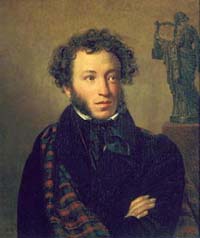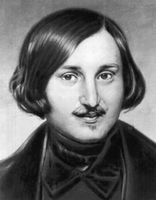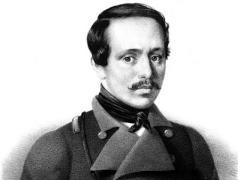 Alexander Sergeyevich Pushkin
Alexander Sergeyevich PushkinAlexander Sergeyevich Pushkin (June 6 1799 – February 10 1837) was a Russian author of the Romantic era who is considered by many to be the greatest Russian poet and the founder of modern Russian literature. Pushkin pioneered the use of vernacular speech in his poems and plays, creating a style of storytelling—mixing drama, romance, and satire. He also wrote historical fiction.
Born in Moscow, Pushkin published his first poem at the age of fifteen. By the time he finished the prestigious Imperial Lyceum in Tsarskoe Selo near Saint Petersburg, the Russian literary scene recognized his talent widely. In 1820 he published his first long poem, Ruslan and Lyudmila.
Pushkin gradually became committed to social reform and emerged as a spokesman for literary radicals. This angered the government, and led to his transfer from the capital (1820). He went to the Caucasus and to the Crimea, then to Kamenka and Chisinau. In 1823 Pushkin moved to Odessa, where he again clashed with the government, which sent him into exile at his mother's rural estate in Mikhailovskoe from 1824 to 1826.
In 1831 Pushkin married. His wife was Natalya Goncharova. In 1837, Pushkin challenged her alleged lover Georges d'Anthès, to a duel which left both men injured, Pushkin mortally. He died two days later. His last home is a museum now.
List of works
Poems
- 1820 –Ruslan and Ludmila
- 1820-21 –The Prisoner of the Caucasus
- 1823 –The Fountain of Bakhchisaray
- 1824 –The Gypsis
- 1829 –Poltava
- 1833 –The Bronze Horseman
Verse novel
- 1825-32 – Eugene Onegin
Drama
- 1825 –Boris Godunov
- 1830 – Malenkie The Little Tragedies
Prose
- 1831 –The Tales of the Late Ivan Petrovich Belkin
- 1834 - The Queen of Spades
- 1836 - The Captain's Daughter
- 1841 - Dubrovsky
Tales
- 1830 - The Tale of the Priest and of His Workman Balda
- 1831 - The Tale of Tsar Saltan
- 1833 - The Tale of the Fisherman and the Fish
- 1833 - The Tale of the Dead Princess
- 1834 - The Tale of the Golden Cockerel
* * *


Nikolai Vasilievich Gogol (31 March 1809 – 4 March 1852) was a Ukrainian-born Russian humorist, dramatist, and novelist.
His early works, such as Evenings on a Farm Near Dikanka, were heavily influenced by Ukrainian culture and folklore. The novels Taras Bul'ba and Dead Souls, the play The Inspector-General, and the short stories Diary of a Madman, The Nose and The Overcoat are among his best known works.
Gogol was born in the Ukrainian Cossack village of Sorochynti. His father Vasily Gogol-Yanovsky, wrote poetry in Russian and Ukrainian, and was an amateur Ukrainian-language playwright who died when Gogol was 15 years old. As a child, Gogol helped stage Ukrainian-language plays in his uncle's home theater.
In 1820 Gogol went to a school of higher art in Nizhyn and remained there until 1828. It was there that he began writing. In 1828, on leaving school, Gogol came to Petersburg. He had hoped for literary fame and brought with him a poem Ganz Küchelgarten. He had it published, at his own expense, under the name of "V. Alov." The magazines he sent it to almost universally derided it. He bought all the copies and destroyed them, swearing never to write poetry again.
In 1831, he brought out the first volume of his Ukrainian stories (Evenings on a Farm Near Dikanka), which met with immediate success. He followed it in 1832 with a second volume, and in 1835 by two volumes of stories entitled Mirgorod, as well as by two volumes of miscellaneous prose entitled Arabesques. At this time, Gogol developed a passion for Ukrainian history. His fictional story Taras Bulba, based on the history of Ukrainian cossacks, was the result of this phase in his interests.
In 1834 Gogol was made Professor of Medieval History at the University of St. Petersburg.
Between 1832 and 1836 Gogol worked with great energy. During this time, the Russian critics Stepan Shevyrev and Vissarion Belinsky, contradicting earlier critics, reclassified Gogol from a Ukrainian to a Russian writer. It was only after the presentation, on 19 April 1836, of his comedy The Government Inspector (Revizor) that he finally came to believe in his literary vocation. The comedy, a violent satire of Russian provincial bureaucracy, was able to be staged thanks only to the personal intervention of Nicholas I.
From 1836 to 1848 he lived abroad, travelling throughout Germany and Switzerland. He eventually settled in Rome. Pushkin's death produced a strong impression on Gogol. His principal work during years following Pushkin's death was the satirical epic Dead Souls. In 1841 the first part of Dead Souls was ready, and Gogol took it to Russia to supervise its printing.
His health was undermined by exaggerated ascetic practices and he fell into a state of deep depression. On the night of 24 February 1852, he burned some of his manuscripts, which contained most of the second part of Dead Souls. He explained this as a mistake, a practical joke played on him by the Devil. Soon thereafter he took to bed, refused all food, and died in great pain nine days later.
* * *
 Mikhail Yuryevich Lermontov
Mikhail Yuryevich LermontovMikhail Yuryevich Lermontov (October 15 1814 – July 27 1841), a Russian Romantic writer, poet sometimes called "the poet of the Caucasus".
Lermontov was born in Moscow. As a small boy Lermontov listened to stories about the outlaws of the Volga region, about their great bravery and wild country life. When he was ten, Mikhail fell sick, and Yelizaveta Alekseyevna, his grandmother, took him to the Caucasus .
The intellectual atmosphere in which he grew up was similar to that experienced by Pushkin. In his early childhood Lermontov was educated by a Frenchman named Gendrot. Yelizaveta Alekseyevna decided to take Lermontov to Moscow, to prepare for gymnasium. In 1828 he entered the gymnasium. He showed himself to be an exceptional student. At that time, along with his poetic passion, Lermontov also developed an inclination for poisonous wit, and cruel and sardonic humor.
After the academic gymnasium, in August 1830, Lermontov entered Moscow University. Lermontov's career at the university was short-lived. He attended lectures faithfully, but he would often read a book in the corner of the auditorium, and rarely took part in student life.
From 1830 to 1834 he attended the cadets school in Saint Petersburg, and in due course he became an officer in the guards. At that time he began writing poetry. He also took a keen interest in Russian history and medieval epics, which would be reflected in the Song of the Merchant Kalashnikov, his long poem Borodino, poems addressed to the city of Moscow, and a series of popular ballads.
To express his own and the nation's anger at the loss of Pushkin (1837) the young soldier wrote a passionate poem,Death of the Poet , — the latter part of which is explicitly addressed to the inner circles at the court, though not to the Tsar himself. The poem all but accuses the powerful "pillars" of Russian high society of complicity in Pushkin's death. The tsar, however, seems to have found more impertinence than inspiration in the address, for Lermontov was forthwith exiled to the Caucasus as an officer in the dragoons. He had been in the Caucasus with his grandmother as a boy of ten, and he found himself at home, with feelings deeper than those of childhood recollection. The stern and rocky virtues of the mountain tribesmen against whom he had to fight, no less than the scenery of the rocks and of the mountains themselves, were close to his heart; the tsar had exiled him to his native land.
Lermontov visited Saint Petersburg in 1838 and 1839, and his indignant observations of the aristocratic milieu, wherein fashionable ladies welcomed him as a celebrity, occasioned his play Masquerade. By 1839 he completed his most important novel, A Hero of Our Time, which prophetically describes a duel like the one in which he would eventually lose his life.
On July 25, 1841, at Pyatigorsk, fellow army officer Nikolai Martynov, who felt hurt by one of Lermontov's jokes, challenged Lermontov to a duel. The duel took place two days later at the foot of Mashuk mountain. Lermontov was killed by Martynov's first shot. Several of his verses were posthumously discovered in his notebook.
* * *
 Lev Nikolaevich Tolstoy
Lev Nikolaevich TolstoyLeo Tolstoy (September 9, 1828 – November 20, 1910), was a Russian writer.
Tolstoy was born in Yasnaya Polyana, the family estate in the Tula region of Russia. Tolstoy's parents died when he was young, so he and his siblings were brought up by relatives. In 1844, he began studying law and oriental languages at Kazan University. Tolstoy left university in the middle of his studies, returned to Yasnaya Polyana and then spent much of his time in Moscow and Saint Petersburg. In 1851, after running up heavy gambling debts, he went with his older brother to the Caucasus and joined the army. It was about this time that he started writing.
Tolstoy is one of the giants of Russian literature. His most famous works include the novels War and Peace and Anna Karenina and novellas such as Hadji Murad and The Death of Ivan Ilyich.
Tolstoy's earliest works, the autobiographical novels Childhood, Boyhood, and Youth (1852–1856), tell of a rich landowner's son and his slow realization of the chasm between himself and his peasants. Though he later rejected them as sentimental, a great deal of Tolstoy's own life is revealed. They retain their relevance as accounts of the universal story of growing up.
Tolstoy served as a second lieutenant in an artillery regiment during the Crimean War, recounted in his Sevastapol Sketches. His experiences in battle helped stir his subsequent pacifism and gave him material for realistic depiction of the horrors of war in his later work.
His fiction consistently attempts to convey realistically the Russian society in which he lived. The Cossacks (1863) describes the Cossack life and people through a story of a Russian aristocrat in love with a Cossack girl. Anna Karenina (1877) tells parallel stories of an adulterous woman trapped by the conventions and falsities of society and of a philosophical landowner (much like Tolstoy), who works alongside the peasants in the fields and seeks to reform their lives. Tolstoy not only drew from his own life experiences but also created characters in his own image, such as Pierre Bezukhov and Prince Andrei in War and Peace, Levin in Anna Karenina and to some extent, Prince Nekhlyudov in Resurrection.
After Anna Karenina, Tolstoy concentrated on Christian themes, and his later novels such as The Death of Ivan Ilyich (1886) and What Is to Be Done?
Tolstoy died in 1910, at the age of 82. He died of pneumonia at Astapovo train station, after falling ill when he left home in the middle of winter.
















